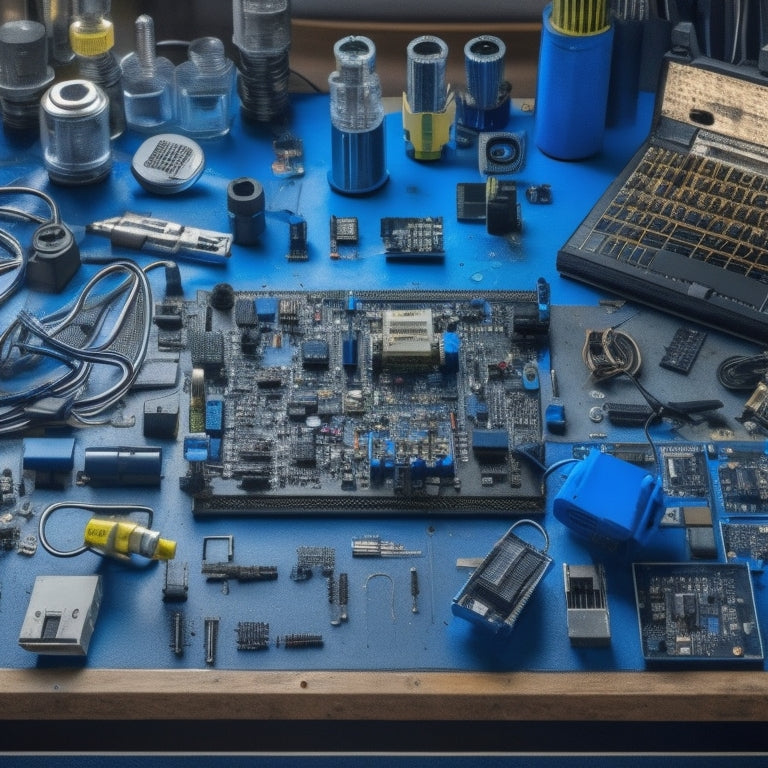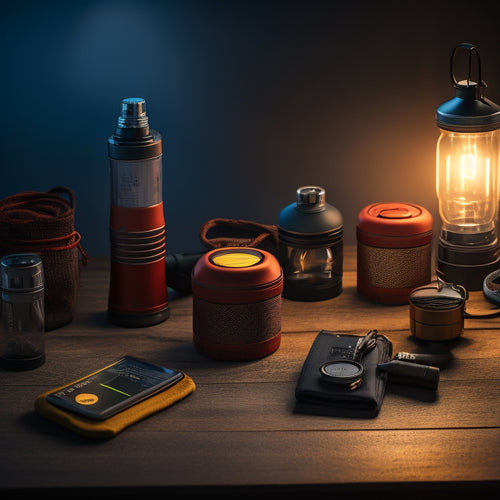
What Connectors Do I Need for My System?
Share
You need connectors that accommodate your specific solar panel system's requirements, considering factors like component compatibility, environmental conditions, and performance needs. Determine the connector types required by analyzing your system's components, such as solar panels, inverters, and mounting hardware. MC4 connectors might be suitable for solar panels, while Y connectors can facilitate parallel wiring. Waterproof connectors can withstand outdoor conditions, and choosing the right wire size is essential. Crimping or soldering techniques can guarantee secure connections. By considering these factors, you'll get the connectors that guarantee your system operates efficiently and reliably - and that's just the beginning of optimizing your system's performance.
Key Takeaways
• Identify the type of system you're building, whether it's a solar panel system, electrical system, or data transfer system, to determine connector needs.
• Consider the environmental conditions your system will operate in, such as outdoor use, high temperatures, or exposure to water or dust.
• Choose connectors that meet certification standards, such as IP ratings, to ensure reliable connections in harsh environments.
• Select connectors that match your system's voltage, current, and power requirements to prevent overheating and electrical surges.
• Consider the type of signal transmission, power distribution, or data transfer required, and choose connectors that can efficiently facilitate these functions.
Understanding Your Solar Panel System
Your solar panel system consists of several key components that work together to convert sunlight into electrical energy. These components include solar panels, an inverter, mounting hardware, and electrical connectors.
To maintain peak performance and extend the lifespan of your system, it's vital to understand how each component interacts and operates. Regular system maintenance is important for achieving the best energy efficiency.
This involves inspecting and cleaning the solar panels, checking electrical connections, and monitoring system performance. A well-maintained system not only guarantees energy efficiency but also reduces the risk of component failure and electrical hazards.
By understanding your solar panel system's components and performing regular maintenance, you can maximize energy production and minimize downtime. This, in turn, leads to significant cost savings and a reduced carbon footprint.
Determining Connector Types Needed
As you analyze your solar panel system, you'll need to identify the specific connectors required for each component. You'll want to examine the electrical and mechanical requirements of each connection, ensuring you choose the right connector type for the job.
System Component Analysis
You must identify the specific components within your system that require connectors, analyzing their mechanical, electrical, and environmental requirements to determine the necessary connector types. This examination is vital, as each component's unique demands will influence the connector selection process.
When exploring system component analysis, ponder the interdependence of components. How do they interact, and what're the implications for connector choice? For example, a high-voltage component may necessitate specialized connectors with enhanced insulation and creepage distance. Similarly, components exposed to harsh environmental conditions, such as high temperatures or moisture, will require connectors designed to withstand these stresses.
To optimize your system, it's crucial to take into account the collective demands of all components. By understanding the intricate relationships between components, you can identify opportunities for system optimization. This holistic approach will enable you to select connectors that not only meet individual component requirements but also synergistically enhance overall system performance.
Connector Function Requirements
To determine the connector types needed, it is essential to identify the specific functions each connector must perform within your system. These functions include signal transmission, power distribution, and data transfer. You'll need to consider the signal frequency, voltage, and current requirements for each connector.
For example, will you need high-speed connectors for data transmission or power connectors for energy distribution? Take into account the environmental factors that may impact your connectors, such as temperature, humidity, and vibration. This will help you establish the necessary level of ruggedness and durability for your connectors.
Additionally, consider cable management strategies to guarantee efficient and organized cable routing. This can improve signal integrity and reduce electromagnetic interference (EMI).
MC4 Connectors for Solar Panels
When you're setting up your solar panel system, you'll need MC4 connectors that guarantee seamless compatibility with your panels.
You'll find that there are different types of MC4 connectors, each designed for specific applications, so it's crucial to choose the right one for your setup.
Solar Panel Compatibility
Solar panels utilize MC4 connectors to facilitate efficient and secure connections, ensuring a reliable flow of electrical energy. As you design your solar panel system, it's important to confirm compatibility between your panels and connectors. You want to maximize energy efficiency, and the right connectors play a significant role in achieving this goal.
When selecting MC4 connectors for your solar panels, consider the following key factors:
-
Certification: Confirm the connectors meet international standards, such as IEC 61215, to guarantee quality and reliability.
-
Current rating: Choose connectors that can handle the maximum current output of your solar panels to prevent overheating and damage.
-
Insulation: Opt for connectors with durable insulation to protect against environmental factors, such as moisture and UV exposure.
-
Cable size: Select connectors compatible with your cable sizes to ensure secure and reliable connections.
-
Brand compatibility: Verify that the connectors are compatible with your solar panel brand to ensure seamless integration.
MC4 Connector Types
You'll need to choose from a variety of MC4 connector types, each designed for specific applications, to guarantee reliable connections in your solar panel system. Understanding the different types of MC4 connectors is essential for efficient energy transfer and system durability.
| Connector Type | Material | Application |
|---|---|---|
| Standard MC4 | Plastic/Polymer | General-purpose solar panel connections |
| MC4-Evo2 | Plastic/Polymer | High-power solar panels and large-scale systems |
| MC4-Plus | Metal/Polymer | High-reliability connections in harsh environments |
| MC4-Hybrid | Hybrid Material | High-temperature and high-voltage applications |
The MC4 connector has a rich history, dating back to the 1990s when it was first introduced as a reliable and efficient connector for solar panels. Over time, advancements in materials and design have led to the development of various MC4 connector types, each catering to specific requirements. Connector materials play a significant role in ensuring reliable connections, with plastic and polymer being the most common materials used.
Efficient Energy Transfer
Choosing the appropriate MC4 connector type for your solar panel system guarantees efficient energy transfer, as a vital connection is essential for optimizing maximum power output. You want to make sure that your solar panels are connected securely to maximize energy production and minimize energy losses. A reliable connection also prevents overheating, which can lead to reduced system lifespan.
Here are some key benefits of using the right MC4 connectors for efficient energy transfer:
-
Minimized Energy Losses: Reduce energy losses due to resistance and heat buildup, resulting in higher energy savings.
-
Optimized Power Output: Ensure maximum power output from your solar panels, leading to increased energy production.
-
Improved System Reliability: Prevent overheating and damage to your solar panel system, reducing maintenance costs and downtime.
-
Enhanced Safety: Reduce the risk of electrical shock and fire hazards with secure, reliable connections.
-
Increased System Lifespan: Extend the lifespan of your solar panel system with reliable connections that withstand harsh environmental conditions.
Y Connectors for Parallel Wiring
When configuring parallel wiring for your system, Y connectors provide a secure and efficient way to split power between multiple components. These adapters offer several benefits, including increased flexibility and reduced cable clutter. By using Y connectors, you can simplify your system's wiring and improve overall reliability.
In parallel wiring configurations, Y adapters play an important role in ensuring efficient energy transfer. They enable you to split power between multiple devices, reducing the risk of voltage drops and overheating. Additionally, Y connectors help to minimize power loss, as they reduce the length of wiring needed to connect multiple components.
As an essential component of parallel wiring, Y adapters offer a range of benefits. They provide a convenient way to add or remove devices from your system, making it easier to upgrade or modify your setup. By choosing high-quality Y connectors, you can ensure reliable performance and minimize the risk of system failures.
Waterproof Connectors for Outdoor Use
When you're designing a system for outdoor use, you're likely to encounter harsh environmental conditions that can compromise your connectors' performance. That's why it's vital to choose waterproof connectors that can withstand exposure to water, dust, and other contaminants.
Harsh Environments Demands
Operating in outdoor environments exposes your system to harsh conditions, including rain, snow, and extreme temperatures, which necessitates waterproof connectors that can withstand these elements.
You need connectors that are built to last, with rugged construction that can resist corrosion and damage from the elements.
To guarantee your system's reliability, look for connectors that offer:
- IP67 or higher rating for protection against water and dust
- Hermetic sealing for complete environmental protection
- Insulation materials that can withstand extreme temperatures
- Shielding to minimize electromagnetic interference
- Materials that can resist corrosion, such as stainless steel or anodized aluminum.
Sealing Technologies Matter
In outdoor applications, you need connectors that can maintain a hermetic seal to prevent moisture and contaminants from penetrating the connection, and that's where advanced sealing technologies come in.
When it comes to waterproof connectors, material selection is important. You'll want connectors made from materials that can withstand harsh environmental conditions, such as extreme temperatures, humidity, and exposure to UV light.
In addition, sealant applications play an essential role in guaranteeing the integrity of the connection. Advanced sealants, such as silicone or epoxy-based compounds, can provide a reliable barrier against moisture and contaminants. These sealants can be applied to the connector's O-ring or gasket, creating a secure and reliable connection.
Moreover, some connectors feature a potting compound that encapsulates the electrical contacts, providing an additional layer of protection against environmental factors.
IP Rating Importance
You must confirm that your connectors have a suitable IP rating to guarantee their reliability in outdoor applications, where they're exposed to various environmental stressors. In harsh outdoor environments, connectors are susceptible to water and dust ingress, which can lead to system failures and downtime.
To guarantee the reliability of your system, it's crucial to choose connectors with a high IP rating, which indicates their level of protection against solid objects and water. A higher IP rating provides better protection against environmental stressors.
Here are some key considerations for selecting connectors with a suitable IP rating:
-
Dust protection: IP6X or higher for complete protection against dust ingress
-
Weather resistance: IPX7 or higher for protection against immersion in water
-
Moisture protection: IPX5 or higher for protection against water jets
-
Corrosion protection: Connectors with coatings or materials that resist corrosion
-
Operating temperature range: Confirm that the connector's operating temperature range matches your system's requirements
In-Line Fuses for Safe Connections
Your system's wiring harness demands protection from electrical overloads and short circuits, which is where in-line fuses come into play, safeguarding your entire setup from catastrophic damage. In-line fuses provide a crucial layer of Fuse Safety, ensuring that your system remains operational and reliable.
These fuses act as a barrier, preventing electrical surges from causing irreparable harm to your components.
When it comes to Connection Reliability, in-line fuses play an essential role. By inserting a fuse in the circuit, you're ensuring that the electrical current is regulated, preventing overheating and electrical fires.
This added layer of protection guarantees that your connections remain stable and secure, even in the event of an electrical anomaly.
With in-line fuses, you can rest assured that your system is protected from the inside out, allowing you to focus on what matters most – innovation and progress.
Choosing the Right Wire Size
When specifying wire sizes for your system, accurately calculating the required ampacity is crucial to prevent overheating, electrical fires, and system downtime. You must consider the maximum current your system will draw and choose a wire size that can handle it. This is known as the wire's ampacity.
To guarantee reliable connections, consider the following factors when selecting wire sizes:
-
Operating voltage: Higher voltages require thicker wires to prevent electrical breakdown.
-
Conductor material: Copper, aluminum, or other materials have different ampacities.
-
Cable flexibility: Flexible cables require more complex wire constructions, impacting ampacity.
-
Environmental factors: Temperature, humidity, and exposure to chemicals or physical stress impact wire performance.
-
System architecture: Series or parallel connections affect wire sizing requirements.
Crimping Vs Soldering Connectors
With wire sizing determined, attention turns to ensuring secure connections, and the choice between crimping and soldering connectors becomes an important decision. As you weigh your options, consider the benefits of each method.
Crimping provides a reliable, gas-tight connection, ideal for high-vibration or harsh environments. When selecting a crimp tool, make sure it's designed for your specific connector type and wire gauge. Crimp Tool Selection is vital, as the wrong tool can compromise connection integrity.
On the other hand, soldering offers a more permanent bond, suitable for applications where connectors won't be frequently connected or disconnected. When soldering, it's important to choose the right Solder Iron Tips to maintain precise temperature control and prevent overheating. Soldering also allows for more compact designs, making it ideal for space-constrained systems.
Both methods require attention to detail and proper technique to ensure a secure, reliable connection. Consider factors like connector type, wire size, and environmental conditions to make an informed decision.
Custom Connector Solutions Available
Depending on your system's unique requirements, you may need custom connector solutions that cater to specific design constraints or performance demands. This is where innovative manufacturers step in to provide tailored solutions. With custom designs, you can overcome limitations posed by standard connectors and guarantee seamless integration with your system.
Some benefits of custom connector solutions include:
-
Unique geometries: Custom connectors can be designed to fit into tight spaces or accommodate unusual shapes.
-
Specialized materials: Innovative manufacturing processes enable the use of exotic materials or coatings to meet specific performance requirements.
-
High-reliability applications: Custom connectors can be engineered to withstand extreme temperatures, vibrations, or other harsh environmental conditions.
-
Compact designs: Custom connectors can be miniaturized to reduce the overall footprint of your system.
-
Enhanced performance: Custom designs can be optimized for high-frequency signals, high-power applications, or other specific performance demands.
Ensuring Compliant Solar Installations
You must make sure that your solar installation complies with relevant industry standards and regulations to guarantee safe and efficient operation. Code compliance is vital to guarantee the reliability and performance of your system. You don't want to risk system failures, safety hazards, or even legal issues due to non-compliance.
To ensure code compliance, you need to familiarize yourself with the relevant industry standards, such as UL (Underwriters Laboratories) and IEC (International Electrotechnical Commission) standards. These standards provide guidelines for the design, installation, and maintenance of solar installations.
You should also consult with local authorities and regulatory bodies to make certain that your system meets local building codes and regulations.
Frequently Asked Questions
Can I Use Connectors From Different Manufacturers?
When selecting connectors, you'll find that manufacturer variance can impact brand interchangeability, so it's important you verify compatibility before mixing connectors from different manufacturers to guarantee seamless system integration and best performance.
How Do I Handle Mismatched Connector Sizes?
You face a 30% risk of system failure due to mismatched connectors. To overcome this, you'll need adapter options for size conversion, ensuring compatibility between connectors while maintaining the correct wire gauge to prevent signal degradation.
Are All MC4 Connectors Compatible With Each Other?
When selecting MC4 connectors, you'll find that not all are compatible due to varying certification standards and industry regulations, so you'll need to verify that the specific models you choose meet the required specifications for your system.
Do I Need Special Tools for Crimping Connectors?
'Do you want to risk damaging your connectors? You'll need a crimping tool and wire strippers to guarantee secure connections. Master various crimping techniques to avoid loose wires and maintain a reliable system.'
Can I Repair Damaged Connectors or Must I Replace Them?
When you're faced with damaged connectors, you'll need to decide whether to repair or replace them. Before making a call, you'll want to perform a thorough wire inspection to assess the extent of the damage, then consider connector refurbishment as a viable option if the damage is minimal.
Related Posts
-

Net Metering in Renewable Energy's Future
Net metering's future is vital for driving renewable energy growth and financial savings. You can reduce your electri...
-

Best Solar Powered Flashlights for Emergency Situations
When you're choosing the best solar-powered flashlights for emergency situations, focus on their brightness, battery ...
-
Average Lifespan of Solar Battery Banks
The average lifespan of solar battery banks generally ranges from 5 to 15 years. This variation mainly stems from the...

